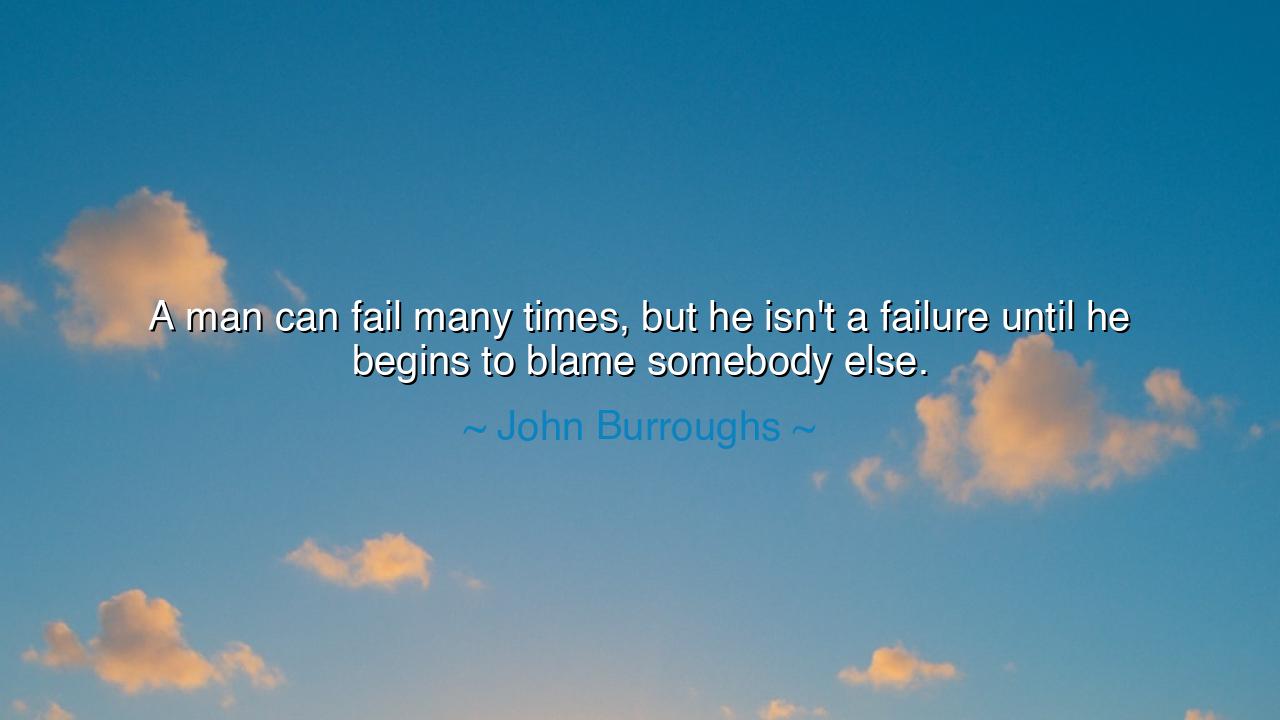
A man can fail many times, but he isn't a failure until he begins
A man can fail many times, but he isn't a failure until he begins to blame somebody else.






Host: The room was quiet, the soft hum of the outside world barely making its way through the window. Jack sat by the window, his gaze fixed on the dimming light outside, his thoughts clearly turning over the meaning behind the words. Jeeny, across from him, was curled up in her chair, a cup of tea in her hands, her mind seeming to reflect on something deeper. The stillness in the room felt like a space waiting to be filled with understanding.
Host: John Burroughs’ words filled the space: “A man can fail many times, but he isn’t a failure until he begins to blame somebody else.” The simplicity of the statement, with its focus on personal accountability, seemed to carry a deep truth about how we face setbacks and challenges. Jack, always one to examine things from a logical perspective, was the first to speak.
Jack: His voice was thoughtful, almost somber: “I get that. Failure happens to everyone. We all face setbacks, challenges, things that don’t go the way we want. But it’s how we respond to those failures that defines us. If we take responsibility for our actions and our choices, then we’re just learning. But if we start blaming others, making excuses, that’s when we turn into a failure. It’s like we’re giving up control, and that’s the real defeat.”
Jeeny: She smiled softly, her voice gentle, but filled with insight: “Exactly. Failure is an experience—it’s a part of life. But it’s not what defines us. What defines us is how we handle that failure. Blaming others may feel easier in the moment, but it doesn’t help us grow or move forward. When we stop owning our mistakes and start pointing fingers, we stop learning, stop taking control of our own path. Accountability is key—it’s the first step in turning failure into an opportunity to learn.”
Host: The room seemed to grow a little heavier as the weight of Burroughs' words settled between them. The idea that failure, while difficult, didn’t define us unless we allowed it to, felt like a powerful realization. Jack, who usually focused on logical solutions, seemed to soften his view, considering the emotional side of failure and the power of personal responsibility.
Jack: His voice softened, almost reflective, as he continued: “Maybe that’s what sets people apart. Some of us face failure and use it as a stepping stone to get better, to try again. Others get stuck in blame—blaming circumstances, other people, anything but themselves. But the moment we start blaming others, we lose the ability to learn from our mistakes. The key isn’t in the failure itself—it’s in how we respond to it.”
Jeeny: Her smile deepened, her voice calm and full of understanding: “Exactly. We all fail. It’s part of the process. But it’s how we handle that failure that determines our growth. Blame doesn’t move us forward; it keeps us stuck in the same place. Taking responsibility and learning from what went wrong—that’s what moves us ahead. It’s the difference between being defeated by failure and using failure as a lesson.”
Host: The room felt a little quieter now, the weight of their conversation settling in. The understanding that failure didn’t have to be the end of the road, but rather a lesson on how to move forward, was both liberating and grounding. Jack and Jeeny sat in the quiet realization that it wasn’t the failure itself, but the response to failure, that defined success. It wasn’t about avoiding mistakes; it was about learning from them and taking responsibility for our own actions.
Jack: His voice, now calmer, almost satisfied, reflected the new understanding: “Maybe that’s the key—failure doesn’t define us. It’s how we respond to it that shapes who we are. The real failure comes when we stop learning, when we stop owning our mistakes and start blaming others.”
Jeeny: She nodded, her voice affirmative, filled with peace: “Exactly. Blaming others doesn’t make us stronger—it keeps us stuck. But when we take responsibility and learn from our failures, we turn them into stepping stones. That’s when we grow.”
Host: The evening continued, but the world outside seemed distant now. Inside, Jack and Jeeny sat in the quiet realization that failure wasn’t something to fear, but something to learn from. The true test wasn’t in avoiding failure, but in how we handled it when it came. Taking responsibility and ownership was the key to turning every setback into an opportunity to grow and move forward.






AAdministratorAdministrator
Welcome, honored guests. Please leave a comment, we will respond soon